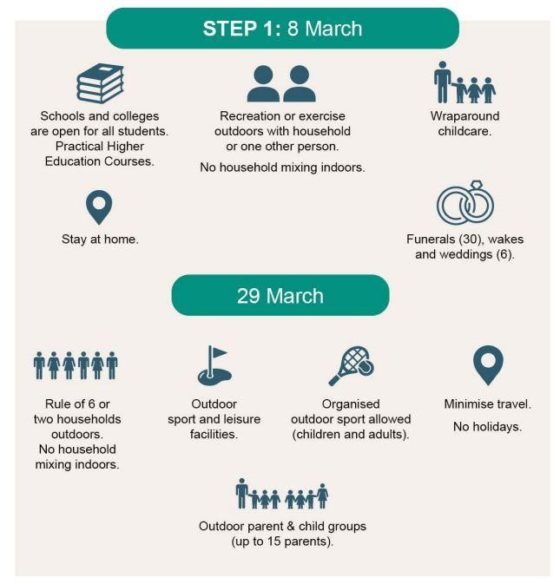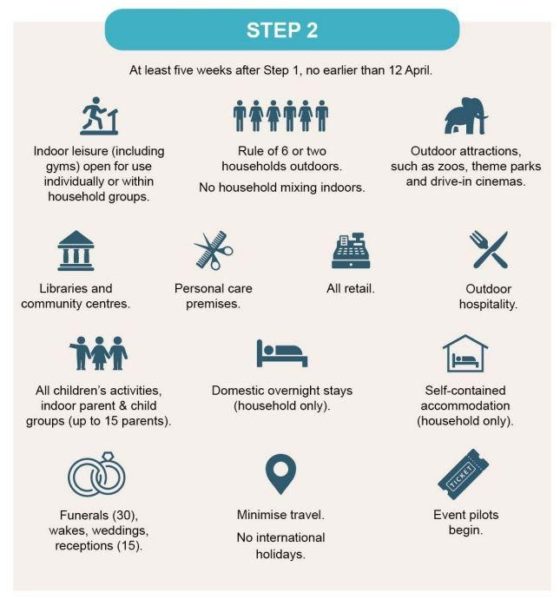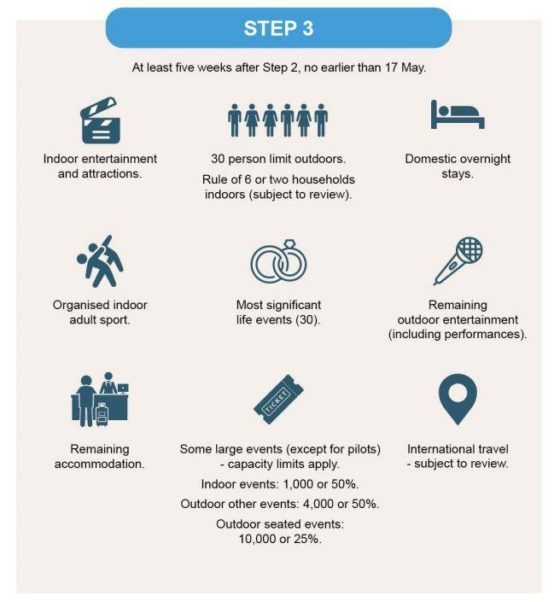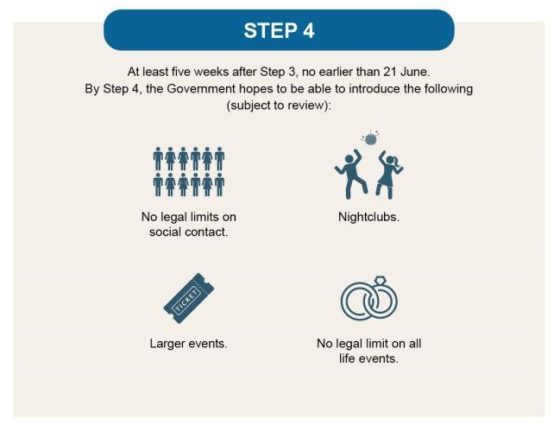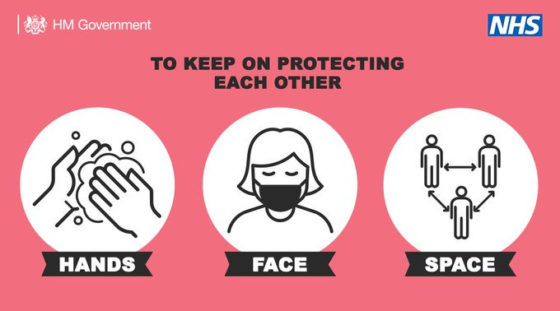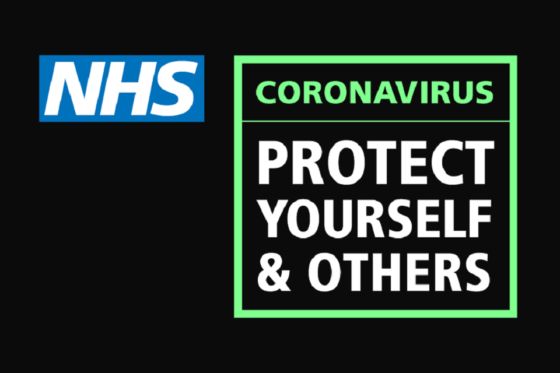On 22 February 2021, the Prime Minster Boris Johnson announced a four-step roadmap out of lockdown to ease restrictions across England and provide a route back to a more normal way of life
Each step is to be assessed against the following four tests before restrictions ease and move to the next phase, starting with the return of schools on 8 March
- The vaccine deployment programme continues successfully.
- Evidence shows vaccines are sufficiently effective in reducing hospitalisations and deaths in those vaccinated.
- Infection rates do not risk a surge in hospitalisations which would put unsustainable pressure on the NHS.
- Our assessment of the risks is not fundamentally changed by new Variants of Concern.
There will be a minimum of five weeks between each step: four weeks for the data to reflect changes in restrictions; followed by seven days’ notice of the restrictions to be eased.
Step 1
March 8
- All children and students return safely to face-to-face education in schools and colleges from 8 March.
- People will be allowed to leave home for recreation and exercise outdoors with their household or support bubble, if they are eligible for one, or with one person from outside their household.
- Care home residents will also be allowed one regular visitor.
March 29
- Outdoor gatherings (including in private gardens) of either 6 people (the Rule of 6) or 2 households will also be allowed.
- Outdoor sports facilities such as tennis and basketball courts, and open-air swimming pools, will be allowed to reopen, and people will be able to take part in formally organised outdoor sports.
- The ‘stay at home’ rule will end on 29 March but many restrictions will remain in place.
- People should continue to work from home where they can and minimise the number of journeys they make where possible, avoiding travel at the busiest times and routes.
- Travel abroad will continue to be prohibited, other than for a small number of permitted reasons. Holidays abroad will not be allowed, given it will remain important to manage the risk of imported variants and protect the vaccination programme. The government has launched a new taskforce to review global travel which will report on 12 April.
Step 2
12 April (no earlier)
- Non-essential retail; personal care premises such as hairdressers and nail salons; and public buildings, including libraries and community centres will be allowed to open.
- Indoor leisure facilities such as gyms will also reopen (but only for use by people on their own or in household groups); as will most outdoor attractions and settings including outdoor hospitality venues, zoos, theme parks, and drive-in cinemas.
- Self-contained accommodation such as campsites and holiday lets, where indoor facilities are not shared with other households, can also reopen.
- Hospitality venues will be allowed to serve people outdoors at Step 2 and there will be no need for customers to order a substantial meal with alcoholic drinks and no curfew, although customers must order, eat and drink while seated (‘table service’).
- Wider social contact rules will apply in all these settings to prevent indoor mixing between different households.
- While funerals can continue with up to 30 mourners, the number of people able to attend weddings, receptions and commemorative events such as wakes will rise to 15.
Step 3
17 May (no earlier)
- Most legal restrictions on meeting others outdoors will be lifted – although gatherings of over 30 people will remain illegal. Indoors, the Rule of 6 or 2 households will apply.
- Most businesses in all but the highest risk sectors will be able to reopen.
- Indoor hospitality will reopen – and as in Step 2, venues will not have to serve a substantial meal with alcoholic drinks; nor will there be a curfew. Customers will, however, have to order, eat and drink while seated.
- indoor entertainment venues such as cinemas and children’s play areas; the rest of the accommodation sector, including hotels, hostels and B&Bs; and indoor adult group sports and exercise classes.
- The government will also allow some larger performances and sporting events in indoor venues with a capacity of 1,000 people or half-full (whichever is a lower number), and in outdoor venues with a capacity of 4,000 people or half-full (whichever is a lower number). In the largest outdoor seated venues, where crowds can be spread out, up to 10,000 people will be able to attend (or a quarter-full, whichever is lower).
- Up to 30 people will be able to attend weddings, receptions and wakes, as well as funerals. This limit will also apply to other types of significant life events including bar mitzvahs and christenings.
Step 4
21 June (no earlier)
- The government hopes to be in a position to remove all legal limits on social contact.
- The government hope to reopen remaining premises, including nightclubs, and ease the restrictions on large events and performances that apply in Step 3.
For the full Government Covid 19 Response for Spring 2021 click here.
